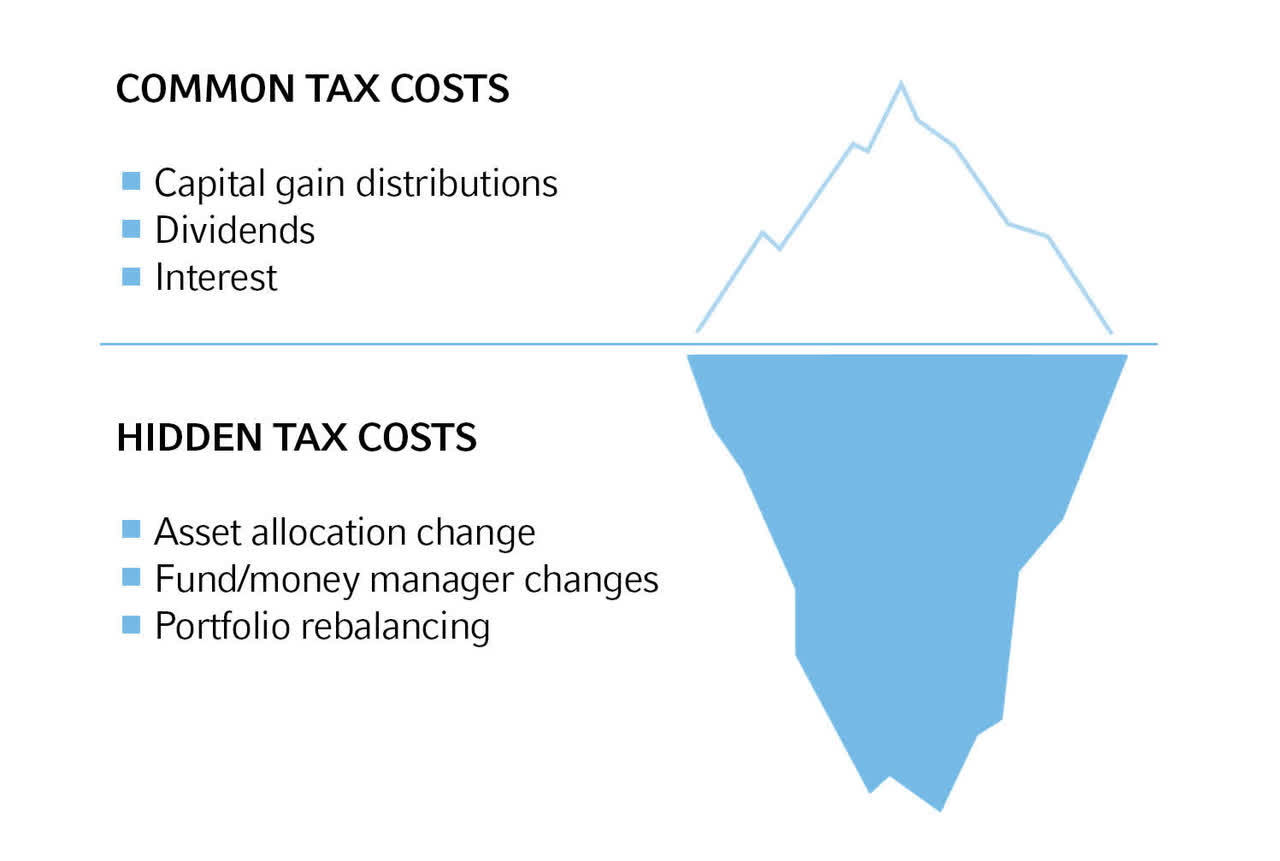We all know what sank the Titanic, right? Aside from the design failures and human error, it was the famous iceberg that sent the “unsinkable” ship to the bottom of the sea. The problem with icebergs is that what you see is not what you get! Most of the iceberg’s mass is hidden under the surface, and that’s where the real danger lay for the Titanic.
At Russell Investments, we believe that one potential iceberg lurking under many investors’ portfolios is taxes.
When you invest in the stock market, you probably expect to earn returns based on the performance of your chosen securities. However, you may not realize that there is another factor that can affect your investment returns: taxes.
As investors, we tend to only focus on a small part of the potential tax implications from investing – those which appear above the water, such as the taxes owed on dividends, interest and capital gains. However, these are, if you will pardon the pun, just the tip of the iceberg.
A portfolio may have other sources of taxation that are not so obvious and yet still create tax consequences. I often think of these hidden tax costs as part of the tax iceberg hiding beneath the surface. These include:
- Asset allocation changes
- Fund or manager changes within a portfolio lineup
- Portfolio rebalancing
These activities can trigger a variety of different taxes that can have long-term consequences on your portfolio. Taxes can reduce your investment returns by taking a bite out of your portfolio value each and every year. This is known as portfolio tax drag. Portfolio tax drag can vary greatly depending on how a total portfolio is managed.
Total tax cost: Adding it all up

As an advisor, it’s important for you to be aware of how these actions create tax drag and take steps to minimize their impact on your clients’ portfolios.
Some possible ways to reduce tax drag include:
Limit unnecessary or frequent portfolio re-balancing:
When managing a taxable investment account, it’s crucial to minimize unnecessary or frequent portfolio rebalancing. This is because each rebalance has the potential to trigger a taxable event, which can impact your overall tax liability. It’s essential to weigh the potential tax consequences alongside the investment merit when considering rebalancing decisions. By doing so, you can make informed choices that help you optimize your portfolio for both performance and tax efficiency.
Harvesting losses to offset capital gains:
One effective tax-saving strategy is tax loss harvesting. This involves selling securities that have decreased in value to realize losses. These losses can then be used to offset capital gains from other securities within your portfolio, potentially reducing your overall tax liability. By actively implementing this strategy throughout the year, you have the potential to significantly lower the tax drag on your total portfolio. It’s a proactive strategy that can help you keep more of your investment gains in your pocket.
Centralize the trading & implementation of a portfolio:
If your portfolio has multiple managers inside of it, aggregating those managers within a single fund can potentially create greater tax efficiencies. This centralization allows for better coordination of trading activities, such as transitioning holdings in-kind to a newly hired manager rather than a full liquidation and repurchase of a desired portfolio for the new manager. This more tax-friendly approach enables you to make adjustments to your manager lineup without triggering unnecessary taxable events.
Beware the danger that lurks below the surface
Seeing what you can see is one thing – this is the risk that can more easily be controlled for. But seeing what you can’t see – this is danger that can sink a portfolio after-tax (pun intended!).
Portfolio tax drag is a hidden cost of investing that can truly reduce your returns and after-tax value over time. It’s important to understand how it works and the strategies to minimize it. It’s even more important to know you can’t see everything.
Disclosures
These views are subject to change at any time based upon market or other conditions and are current as of the date at the top of the page. The information, analysis, and opinions expressed herein are for general information only and are not intended to provide specific advice or recommendations for any individual or entity.
This material is not an offer, solicitation or recommendation to purchase any security.
Forecasting represents predictions of market prices and/or volume patterns utilizing varying analytical data. It is not representative of a projection of the stock market, or of any specific investment.
Nothing contained in this material is intended to constitute legal, tax, securities or investment advice, nor an opinion regarding the appropriateness of any investment. The general information contained in this publication should not be acted upon without obtaining specific legal, tax and investment advice from a licensed professional.
Please remember that all investments carry some level of risk, including the potential loss of principal invested. They do not typically grow at an even rate of return and may experience negative growth. As with any type of portfolio structuring, attempting to reduce risk and increase return could, at certain times, unintentionally reduce returns.
The information, analysis and opinions expressed herein are for general information only and are not intended to provide specific advice or recommendations for any individual entity.
Russell Investments’ ownership is composed of a majority stake held by funds managed by TA Associates Management L.P., with a significant minority stake held by funds managed by Reverence Capital Partners L.P. Certain of Russell Investments’ employees and Hamilton Lane Advisors, LLC also hold minority, non-controlling, ownership stakes.
Frank Russell Company is the owner of the Russell trademarks contained in this material and all trademark rights related to the Russell trademarks, which the members of the Russell Investments group of companies are permitted to use under license from Frank Russell Company. The members of the Russell Investments group of companies are not affiliated in any manner with Frank Russell Company or any entity operating under the “FTSE RUSSELL” brand.
Russell Investments Financial Services, LLC, member FINRA (www.finra.org), part of Russell Investments.
RIFIS-25736
Original Post
Read the full article here









Leave a Reply